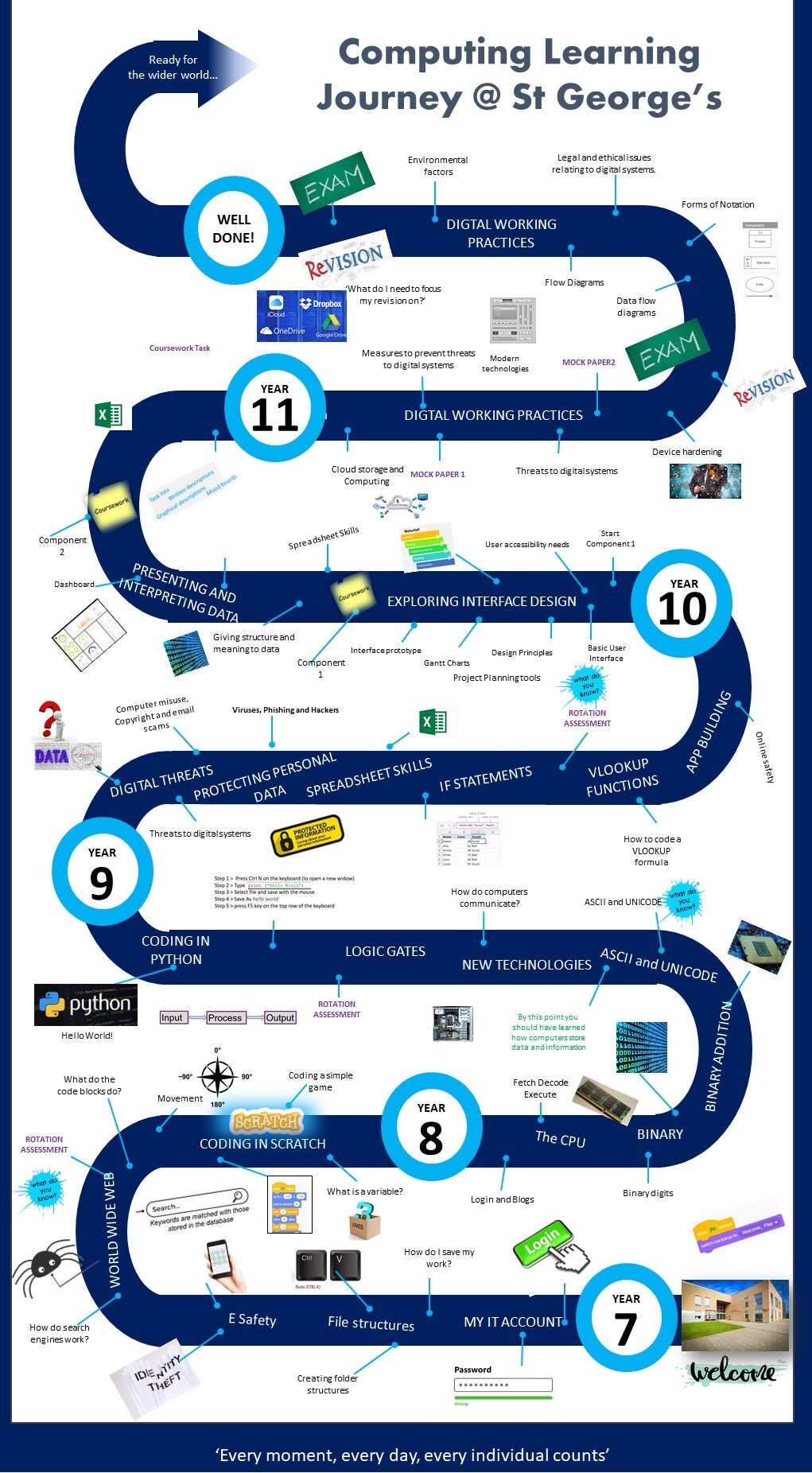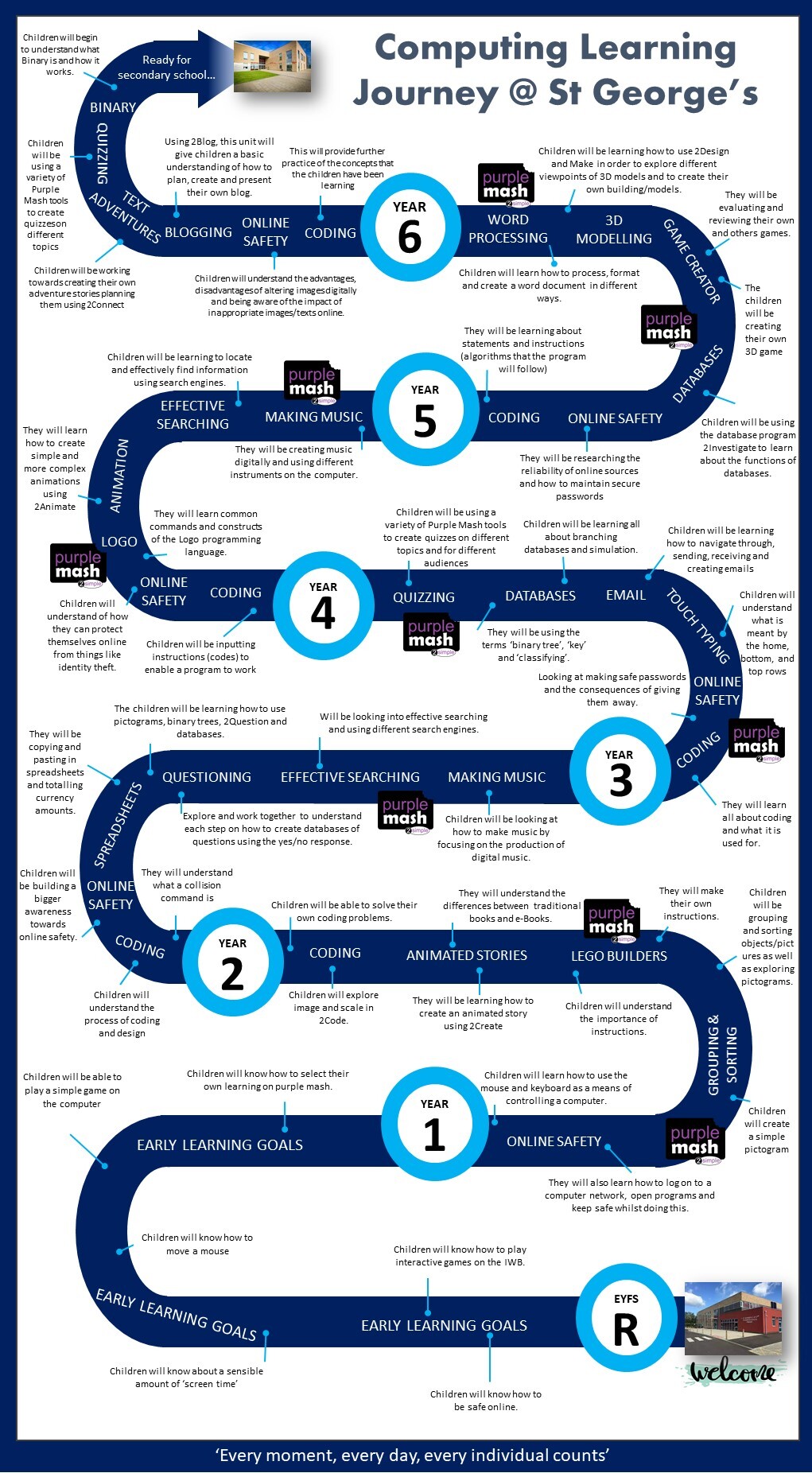Digital Information Technology (Level 2 BTEC)
Subject Vision
Adventurous – Within the Computing curriculum we encourage student to take risks or to try out new methods, ideas, or experiences to gain knowledge, skills and understanding through practical and theoretical lesson activities. We aim to create a learning environment that allows students to step outside their comfort zone, to explore new topics and flourish within a safe and supportive learning environment.
Challenging – Classroom activities are designed and created to enable students to become independent learners, effective decision makers and well- rounded IT users. Challenge within Computing involves testing student’s ability; through questioning, peer assessment and extension tasks that stretch and push student to complete tasks independently through the use of formal written assessment. Preparing for coursework and exams provide a platform that allows students to be challenged and thrive.
Resilience – It is important to us to deliver a curriculum that will interest and enthuse students; to provide a computing curriculum that allows for a wealth of positive learning experiences that will build strong and resilient character traits that can be relied upon for future prosperity. We believe that one of the keys to building resilience in Computing is to equip our student with the ability to problem solve and lesson are geared around this ethos to give our student every opportunity to do so.
Curiosity – Establishing high expectations, setting goals and being a role model is paramount within this subject. ICT tools and technologies are used to motivate students to expand their knowledge and skills, positive feedback and encouragement from teachers and peers alike create a learning environment that allows learners to go beyond the classroom and into the wider world with the purpose of potentially pursuing the possibility of a future career in Computing.
Independence - Students have the opportunity to develop and apply their newly acquired knowledge alongside developing a range of invaluable practical IT skills, such as interface design and development and spreadsheet modelling techniques. Building confidence within the Computing classroom is a key factor in this and with the support and expertise of classroom teachers and peer alike, the curriculum aims to nurture this.
Community– Research says that when students work together they retain information quicker and longer, they develop critical thinking skills and build better communication skills. Completing paired and team lesson activities forms and essential part of the Computing curriculum building a sense of community and belonging.
Homework
|
Year 11 – Friday |
Our Learning Journey


Revision - BTEC Level 2 Tech Award (KS4)
GENERAL INFORMATION (USEFUL INFORMATION FOR PARENTS)
Pupils studying level 2 DIT will receive three timetabled lessons a week, in Year 10 and 11.
Component 1 and 2 are completed in Year 10
Component 3 in Year 11
In Year 11 pupils will spend the first two terms revising for their January exam. Pupils will have the opportunity to re sit this exam in the summer of Year 11.
- Graded from U through to Distinction
| Personal Learning Checklist | Click Here |
|---|---|
| Example Exam Questions/Model Answers | |
| Revision Materials/Sharepoint | Revision Material = DIT flashcards LAA_ Modern Technologies DIT flashcards LAB_ Threats to Digital Systems DIT flashcards LAC_ Legal and Ethical Considerations DIT flashcards LAD_ Planning and Notation (Pupils must log in with their username as their usual computer login followed by @st-georgescofe-thanet.kent.sch.uk (e.g. JSmith123@st-georgescofe-thanet.kent.sch.uk) and their usual password they use to log on to school laptops) |



